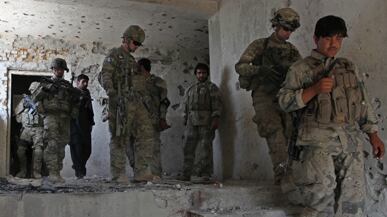The bin Laden raid showed that the U.S. cannot rely on Pakistan to fight al Qaeda—and a base in Afghanistan is needed, writes Bruce Riedel, who helped shape the Obama team's AfPak policy. Plus, full coverage of Osama bin Laden's death.
The U.S. raid into Pakistan's heartland that killed Osama bin Laden was possible only because America and NATO are engaged in Afghanistan. The crucial linkage between our Afghan war policy and President Obama's goal of defeating al Qaeda was underscored by the Navy SEALs' mission. Simply put, we can't put pressure on al Qaeda without Afghanistan forward operating bases, and we clearly can't trust Pakistan to handle al Qaeda alone.
Bin Laden was not in a cave cut off from the world as George W. Bush and others said he was. Instead, he was running a command center for al Qaeda and communicating with its franchises around the Islamic world, according to news accounts of what was found in his lair. Other accounts suggest bin Laden was planning to meet an Indonesian master terrorist named Um Patek, who was involved in the 2002 Bali bombing that killed more than 200 people. That was before Patek was caught in January—very near to bin Laden's hideout in Abbottabad.

In short, al Qaeda's leader was organizing global terrorism from a headquarters deep inside Pakistan. He may have dyed his hair and liked to rewatch his own propaganda videos, but he was also dangerous.
The notion that al Qaeda was neutered was just plain wrong. Al Qaeda will now rebuild a new leadership cadre and command center around its surviving bosses, like Ayman al-Zawahri and Muhammad Ilyas Kashmiri. They will get help from the support networks in Pakistan that helped hide bin Laden for a decade. Such allies as Lashkar-e-Taiba will assist. The extent of Pakistani support for al Qaeda—certainly from other terror groups and probably from parts of the army—is the most important revelation of the raid.
It is fantasy to think we can target these terrorist networks in Pakistan without a base nearby in Afghanistan. The Arabian Sea is too far away. Cruise missiles don't work. We need Afghanistan for both drone operations and commando raids. Without a substantial force, in-country human intelligence collection across the border will also dry up. The Afghans let us operate from their turf because we fight the Taliban, al Qaeda's ally. Unfortunately, our efforts in Afghanistan are still struggling to recover from years of neglect due to the Iraq War.
The extent of Pakistani support for al Qaeda is the most important revelation of the raid.
The Taliban's spring offensive began with an assault in Kandahar this week akin to the 1968 Tet offensive in Vietnam. The insurgents infiltrated the city and attacked government buildings. Their tactics were vintage al Qaeda: multiple suicide bombers and car bombs with fighters prepared to fight until killed. This followed a mass prison break in the city. Together, the two operations demonstrated the fragile nature of NATO's hold on Afghanistan's second city. It showed that any substantial drawdown of NATO forces this summer would be strategically unwise and risky. The Afghan army is getting stronger but it is not anywhere near ready to operate alone in the Pashtun south.
The Taliban offensive was planned from the group's safe havens in Pakistan. Those have enjoyed Pakistani army support for years. Of course, Pakistani duplicity means we can't rely on them to disrupt al Qaeda. As the intelligence community examines bin Laden's laptop and other gear, the extent of that duplicity will become clearer. Well-informed Pakistani press accounts hint it will point very high into the army command.
So, Bin Laden's demise is a victory, but the end of this conflict is not yet in sight. It is tempting to declare mission accomplished and run for the exit, but we know from bitter experience that pretending victory is at hand is a terrible delusion.
Bruce Riedel, a former longtime CIA officer, is a senior fellow in the Saban Center at the Brookings Institution. At President Obama's request, he chaired the strategic review of policy toward Afghanistan and Pakistan in 2009. He is author of the new book Deadly Embrace: Pakistan, America and the Future of the Global Jihad and The Search for Al Qaeda: Its Leadership, Ideology and Future.





